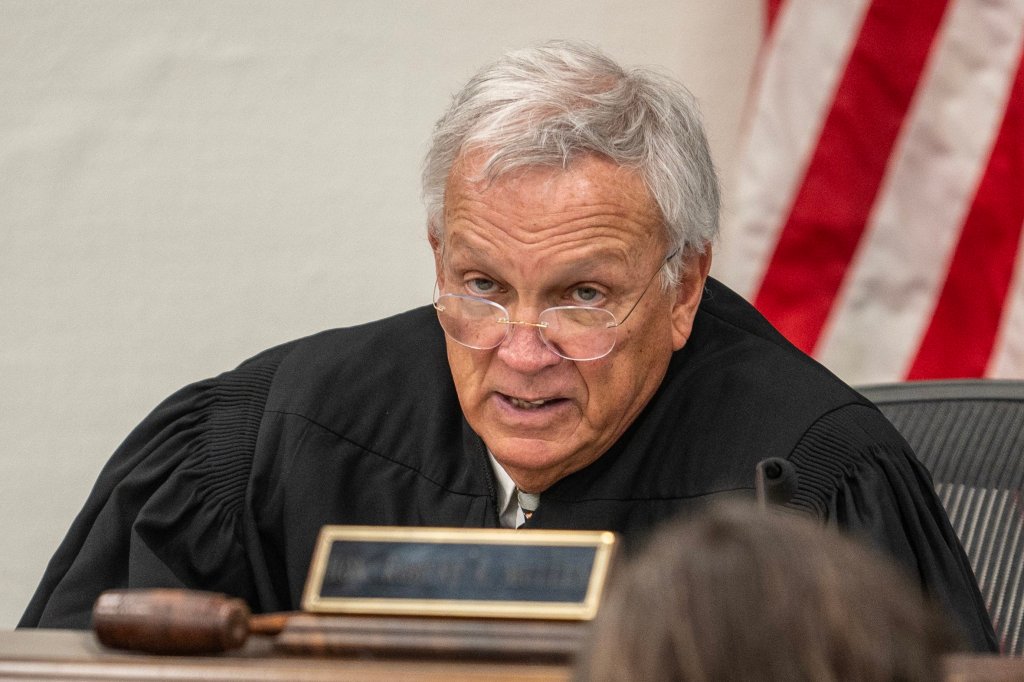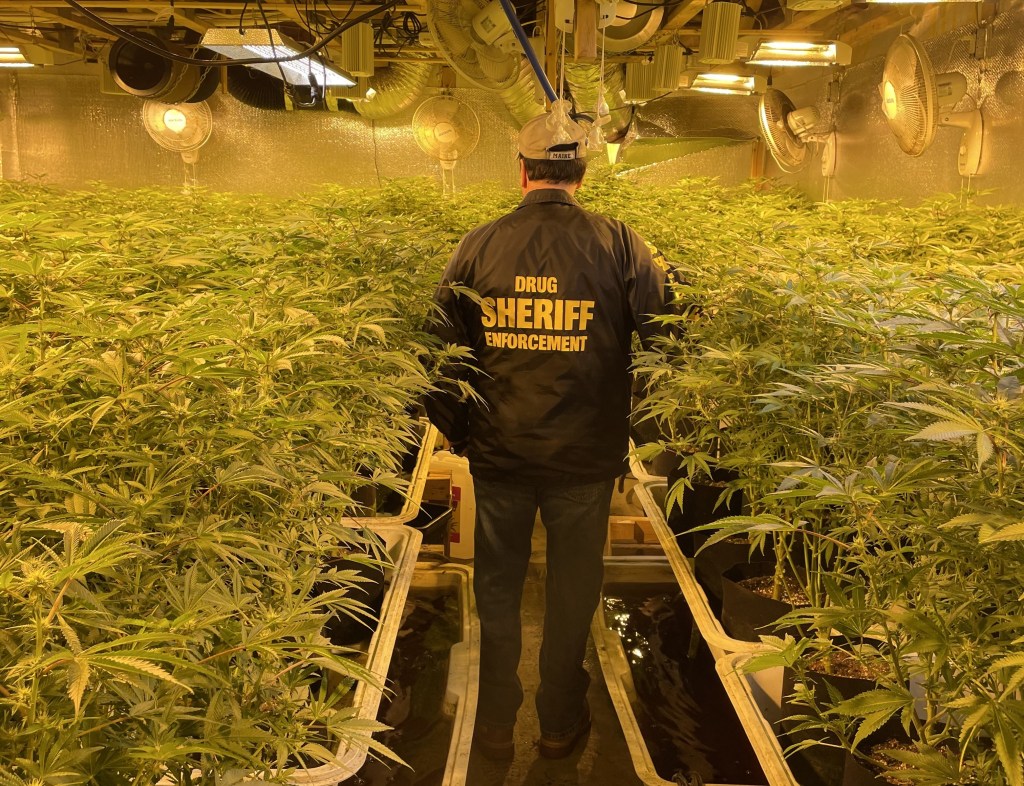SKOWHEGAN — The crackdown on illegal marijuana growing allegedly tied to Chinese organized crime has created a “logjam” of cases in Somerset County as they inch toward trials, a judge said, in large part because each trial will need multiple Cantonese-English interpreters.
Superior Court Chief Justice Robert E. Mullen’s comments came as eight of the 16 cases filed in the county since the beginning of 2024 were heard for docket call last week and tentatively set for trials in either November or early 2026.
Mullen said the court would schedule the trials, each estimated to last two days, if it can find the interpreters needed.
But given the circumstances, he was urging prosecutors and defense attorneys to come back to the negotiating table to break what he called the “logjam.”
“It’s a pretty unique situation that I think is going to call for a unique solution,” Mullen said in court Wednesday.

Referring to the cases collectively as the “grow house” cases, and noting the defendants are all of Chinese descent, Mullen said many of the defendants have no apparent ties to Maine and no criminal records. Some could potentially face deportation if convicted, he said.
For those reasons, along with the challenge of finding interpreters, Mullen said he would accept plea agreements in which a defendant would serve no jail time but pay a $5,000 fine the day of sentencing and agree to not return to Maine.
“As of yet, I’ve had no takers,” Mullen said.
At some point, Mullen said, speedy trial rights will come into play. Many of the cases are at least one year old.
Plea offers discussed in court last week in several cases would entail a slight reduction in charges from Class B to Class C offenses and six months in jail, in addition to the large fine. Most of the defendants, who rejected the offers, face a combination of drug trafficking and marijuana cultivation charges.
Angela Jensen, who represents Shubing Gao who is charged with unlawful trafficking in scheduled drugs and cultivating marijuana after being arrested in December in Cornville, said in court Wednesday that District Attorney Maeghan Maloney had personally made the offer to settle the case. That meant Jensen was not able to negotiate with the assistant district attorney assigned to the case, she said.
Maloney, the elected top prosecutor for Kennebec and Somerset counties, could not be reached last week because she was attending to a personal matter.
Maloney is “very involved” in the cases, Deputy District Attorney Frank Griffin said, although he could not speak to whether a standard plea agreement is being offered to each defendant.
Griffin also could not say whether Mullen’s comments will affect the district attorney’s office’s approach to the plea agreements.
Putting on a trial with several interpreters can be a “nightmare,” Griffin said.
“It’s a massive undertaking of resources for law enforcement to even get us to this point, and then for the court to get interpreters and have a trial,” Griffin said. “It’s a lot of resources.”

In the court proceedings so far, one Cantonese-English interpreter has assisted the defendants. A trial would require three, Mullen said Wednesday.
The Maine Judicial Branch has two qualified Cantonese-English interpreters on its roster, but they are not assigned to trials, court spokesperson Barbara Cardone said.
For trials, the Judicial Branch contracts certified or otherwise qualified interpreters from other states, most recently Massachusetts and Maryland, Cardone said. The state would pay for their travel expenses.
Interpreters must be in-person for trials, Cardone said. Remote telephonic interpretation is available at courthouse clerk’s offices and for some court proceedings.
Interpreters are assigned either to interpret between a party and attorney or to interpret everything else said in the courtroom, according to information on the Judicial Branch website. If a court proceeding lasts two hours or longer, the court appoints more interpreters as necessary to prevent interpreter fatigue. The court system pays for interpreters needed for court proceedings.
In addition to the eight cases heard for trial scheduling last week, six other cases with similar charges were pending, according to court records. Three of those have scheduled court dates in December, and the other three had no future court dates scheduled as of Wednesday, a court clerk in Skowhegan said.
One case in Somerset County was resolved in December 2024. Xi Qiang Zhao, 58, who has addresses in both Skowhegan and Brooklyn, New York, pleaded guilty to one Class D count of marijuana cultivation with a deferred disposition. If Zhao complies with the terms of the deferred disposition agreement, prosecutors will dismiss the misdemeanor-level charge when he returns to court Dec. 8.
One other case was dismissed as federal prosecutors filed related charges in U.S. District Court, records show. The federal case is pre-trial and the defendant, Jiamin Liao, has pleaded not guilty to two counts of maintaining a marijuana-involved premises.
Law enforcement agencies in other parts of the state made arrests amid the early 2024 crackdown on illegal grows, but determining the status of all cases was not possible as Maine maintains most of its court records in physical files stored at individual courthouses.
Most of the so-called grow house busts, including those in Somerset County, were in the first half of 2024.
The Somerset County Sheriff’s Office has executed two dozen search warrants at suspected illegal cannabis growing facilities since January 2024, Sheriff Dale Lancaster said earlier this year. Investigators have seized a total of approximately 30,000 marijuana plants, 500 pounds of processed marijuana, $51,000 in cash and six vehicles in the busts, Lancaster said. Not all of the search warrants executed led to arrests.

The U.S. Attorney’s Office in Maine said in May 2024 that federal authorities believe many illegal growing operations in Maine could be connected to organized, transnational crime organizations with ties to China. The estimated number of illegal grows in Maine fell from more than 200 last year to fewer than 100, Andrew Lizotte, the assistant U.S. attorney leading the federal investigation into the grows, said in March.
Lancaster said previously he believes the operations in Maine fund the production of fentanyl in China and has since said investigating the suspected illegal grows remains a priority for his office, even as the busts slowed down later in 2024 and into this year.
In Massachusetts, federal prosecutors charged seven people in July in connection with “a multi-million-dollar conspiracy to cultivate and distribute marijuana across the Northeast that used interconnected grow houses concealed inside single-family properties in Massachusetts and Maine.”
Prosecutors alleged the Chinese nationals were smuggled into the country to work in the grow houses and denied access to their passports. Two of those indicted were licensed to grow medical marijuana in Maine, the Portland Press Herald reported.
The investigations across Maine put officials at odds over whether human trafficking is involved in the growing operations, and also has raised issues about public health due to the presence of black mold found at some residences and chemicals found at others.
Federal prosecutors in Maine, meanwhile, have been successful in taking three homes in Cornville, Corinna and Sangerville, which they believe were housing illegal growing operations, through civil forfeiture. There were two similar forfeiture cases for properties in Norridgewock and Machias that were pending in U.S. District Court as of Thursday, court records show. One other case regarding a property in China was settled in September: The owner agreed to forfeit $30,000 to the U.S. government and sell the home.
Some homes used as illegal growing sites have headed to the real estate market. Others are becoming legal, medical cannabis growing facilities, a Morning Sentinel investigation found.
At least one man has started a business helping illegal grows shift into the medical market. A former state lawmaker turned cannabis industry consultant was also involving in helping some growers get licenses.

We invite you to add your comments. We encourage a thoughtful exchange of ideas and information on this website. By joining the conversation, you are agreeing to our commenting policy and terms of use. More information is found on our FAQs. You can modify your screen name here.
Comments are managed by our staff during regular business hours Monday through Friday as well as limited hours on Saturday and Sunday. Comments held for moderation outside of those hours may take longer to approve.
Join the Conversation
Please sign into your CentralMaine.com account to participate in conversations below. If you do not have an account, you can register or subscribe. Questions? Please see our FAQs.